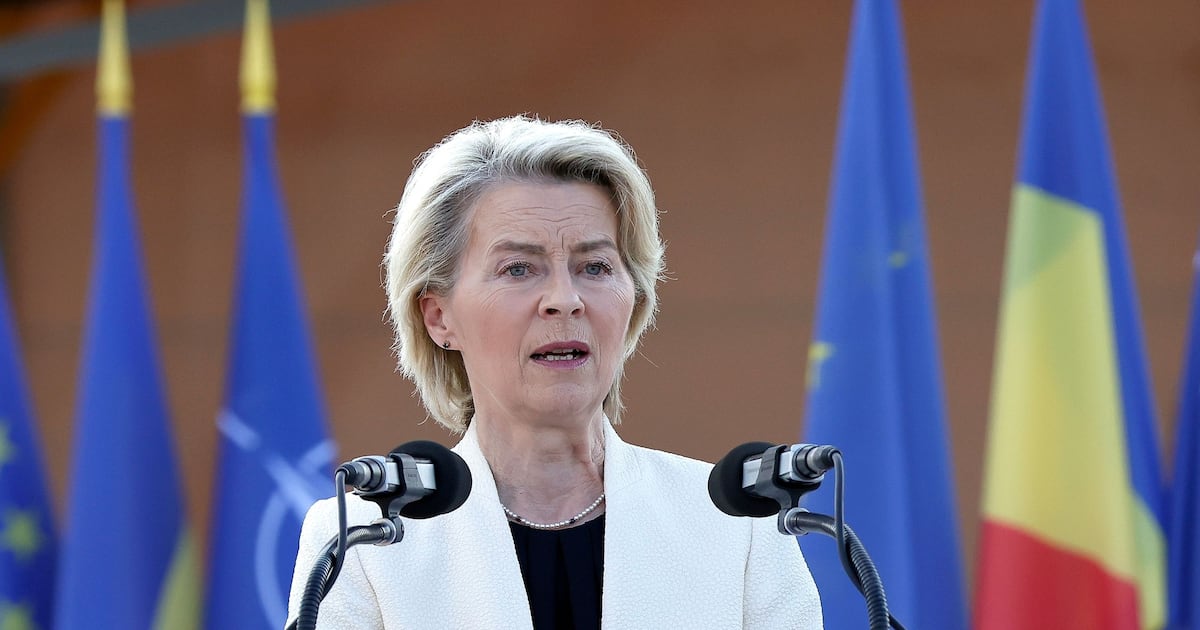European Commission president Ursula von der Leyen has proposed the EU’s trade agreement with Israel be suspended, in protest over the “catastrophic” conditions caused by its ongoing war in Gaza.
In a speech to the European Parliament, Dr von der Leyen said the European Union “cannot afford to be paralysed” in response to the ongoing humanitarian crisis in the war-torn Palestinian enclave.
A more limited proposal to suspend Israel’s access to EU Horizon research funding for start-up companies remains blocked, due to opposition from Germany, Italy, Hungary and a small number of other member states.
Campaigners and pro-Palestine activists have long called for the EU to suspend its free-trade deal with Israel, as a way to put pressure on the Israeli government to pull back from its devastating bombardment of Gaza.
The new proposal from the commission, which is the EU’s executive arm that drafts laws, would require the support of a weighted majority of the 27 member states to suspend the trade deal.
[ Why Ursula von der Leyen’s shift on Israeli sanctions is significantOpens in new window ]
Two big holdouts, Germany and Italy, will be likely to come under greater political pressure to shift position and support the suspension of the EU-Israel trade agreement.
At least 64,000 Palestinians have been killed by Israeli forces during almost two years of war. Israel’s invasion of Gaza was launched in response to the October 7th, 2023, attacks by Hamas militants on southern Israel.
Famine has been declared in parts of Gaza, with warnings it will spread throughout the bombarded Palestinian enclave if Israel continues to restrict the entry of aid.
“What is happening in Gaza has shaken the conscience of the world,” Dr von der Leyen told the European Parliament. “People killed while begging for food. Mothers holding lifeless babies. These images are simply catastrophic.
“We will propose sanctions on the extremist [Israeli] ministers and on violent settlers and we will also propose a partial suspension of the association agreement on trade-related matters,” she said in her speech to MEPs.
Dr von der Leyen, a centre-right German politician, said the EU would put its “bilateral support” to Israel on hold.
The freeze in payments and financial support would not affect funding of Israeli civil society organisations or Yad Vashem, the official memorial institution to the victims of the Holocaust.
The commission has been criticised for being too slow to push back against Israel, since the start of its invasion of Gaza, with Dr von der Leyen often the target of that criticism.
In her so-called “state of the union” address, Dr von der Leyen said Ukraine needed more support to defend itself against the Russian invasion.
Signalling another policy shift, Dr von der Leyen said almost €200 billion in frozen Russian assets would be leveraged further to fund “reparation loans” for Ukraine.
She proposed hosting an international summit focused on securing the return of Ukrainian children abducted by Russia, since its full-scale invasion of Ukraine.
Europe was involved in a fight for its future, she said. “Battle lines for a new world order based on power are being drawn right now,” she said.
The EU needed to be able to defend itself and guarantee its own security, she said.
The commission president questioned whether the union had the “stomach” to fight, or only wanted to bicker among itself.
In a nod to possible internal reforms, Dr von der Leyen said foreign policy decisions should no longer require unanimous agreement of all 27 capitals, something that has allowed far-right Hungarian prime minister Viktor Orban to consistently block the EU taking joint action.
Separately, Dr von der Leyen said there was a need for a “radical” change of thinking on housing policy, to tackle housing shortages in countries across the continent.
This would include making changes to EU state aid rules, “to enable housing support measures,” she said.
Dr von der Leyen turned to criticism of the EU’s unbalanced tariff deal struck with US president Donald Trump’s administration, which saw the union agree to 15 per cent import levies on future trade.
The German politician said she would “never gamble with people’s jobs or livelihoods” and defended the tariff deal as necessary to avert the chaos of a “full-fledged trade war”.

